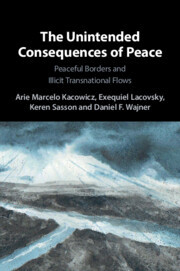Description
The Unintended Consequences of Peace
Peaceful Borders and Illicit Transnational Flows
Authors: Kacowicz Arie Marcelo, Lacovsky Exequiel, Sasson Keren, Wajner Daniel F.
Language: English
Subject for The Unintended Consequences of Peace:
Approximative price 34.17 €
In Print (Delivery period: 14 days).
Add to cart
The Unintended Consequences of Peace
Publication date: 03-2024
312 p. · Paperback
Publication date: 03-2024
312 p. · Paperback
Approximative price 96.56 €
In Print (Delivery period: 14 days).
Add to cart
The Unintended Consequences of Peace
Publication date: 07-2021
320 p. · 15.8x23.5 cm · Hardback
Publication date: 07-2021
320 p. · 15.8x23.5 cm · Hardback
Description
/li>Contents
/li>Biography
/li>
Scholars of international relations generally consider that under conditions of violent conflict and war, smuggling and trans-border crime are likely to thrive. In contrast, this book argues that in fact it is globalisation and peaceful borders that have enabled transnational illicit flows conducted by violent non-state actors, including transnational criminal organizations, drug trafficking organizations, and terrorist cells, who exploit the looseness and demilitarization of borderlands. Empirically, the book draws on case studies from the Americas, compared with other regions of the world experiencing similar phenomena, including the European Union and Southeast Europe (the Western Balkans), Southern Africa, and Southeast Asia. To explain the phenomenon in itself, the authors examine the type of peaceful borders and regimes involved in each case; how strong each country is in the governance of their borderlands; their political willingness to control their peaceful borders; and the prevailing socio-economic conditions across the borderlands.
Preface; 1. The reality of peaceful borders and illicit transnational flows; 2. A framework to explain the reality of peaceful borders and illicit transnational flows; 3. The Americas: a general view; 4. The Americas: from the US-Canadian border to the tri-border area of South America; 5. Europe: the Schengen regime and the western Balkan borders; 6. A triangle of peace in the middle east: the Israeli-Egyptian and Israeli-Jordanian borders; 7. The southern African borders in the post-apartheid era; 8. ASEAN and the southeast Asian borders; 9. Comparisons, policy recommendations and conclusions; References.
Arie M. Kacowicz is Professor of International Relations and the Chaim Weizmann Chair in International Relations at the Hebrew University of Jerusalem, Israel.
Exequiel Lacovsky is a research associate at the Harry S. Truman Research Institute for the Advancement of Peace at the Hebrew University of Jerusalem.
Keren Sasson is a senior consultant for strategic and military affairs in the Israeli Ministry of Defense and holds a PhD in International Relations from the Hebrew University of Jerusalem.
Daniel F. Wajner is a postdoctoral fellow at the SCRIPTS Cluster, Freie Universitat Berlin, and a Lecturer at the Department of International Relations and the European Forum at the Hebrew University of Jerusalem.
Exequiel Lacovsky is a research associate at the Harry S. Truman Research Institute for the Advancement of Peace at the Hebrew University of Jerusalem.
Keren Sasson is a senior consultant for strategic and military affairs in the Israeli Ministry of Defense and holds a PhD in International Relations from the Hebrew University of Jerusalem.
Daniel F. Wajner is a postdoctoral fellow at the SCRIPTS Cluster, Freie Universitat Berlin, and a Lecturer at the Department of International Relations and the European Forum at the Hebrew University of Jerusalem.
© 2024 LAVOISIER S.A.S.




